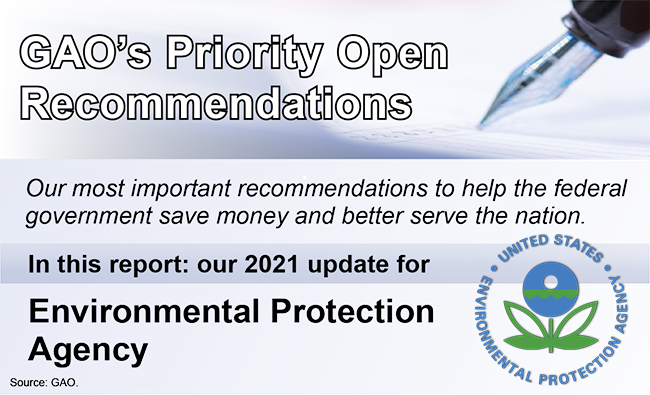Priority Open Recommendations: Environmental Protection Agency
Fast Facts
Each year, we make more than 1,000 recommendations to help improve the federal government. We alert department heads to where they can save the most money, address issues on our High Risk List, or significantly improve government operations.
This report outlines our 22 priority open recommendations for the Environmental Protection Agency (EPA) as of June 2021.
For example, in November 2020, we recommended that EPA develop a plan to modernize the national ambient air quality monitoring system.
Since our previous letter in April 2020, EPA implemented 6 of our priority recommendations.

Highlights
What GAO Found
In April 2020, GAO identified 21 priority recommendations for the Environmental Protection Agency (EPA). Since then, EPA has implemented six of those recommendations by, among other things, taking actions to better track and promote water utilities' implementation of asset management and updating its guidance on testing for lead in drinking water at schools.
In June 2021, GAO identified seven additional priority recommendations for EPA, bringing the total number to 22. These recommendations involve the following areas:
- assessing and controlling toxic chemicals;
- reducing pollution in the nation's waters;
- ensuring cybersecurity at EPA;
- addressing data, cybersecurity, and risk communication issues for drinking water and wastewater infrastructure;
- managing climate change risks; and
- protecting the nation's air quality.
EPA's continued attention to these issues could lead to significant improvements in government operations.
Why GAO Did This Study
Priority open recommendations are the GAO recommendations that warrant priority attention from heads of key departments or agencies because their implementation could save large amounts of money; improve congressional and/or executive branch decision-making on major issues; eliminate mismanagement, fraud, and abuse; or ensure that programs comply with laws and funds are legally spent, among other benefits. Since 2015 GAO has sent letters to selected agencies to highlight the importance of implementing such recommendations.
